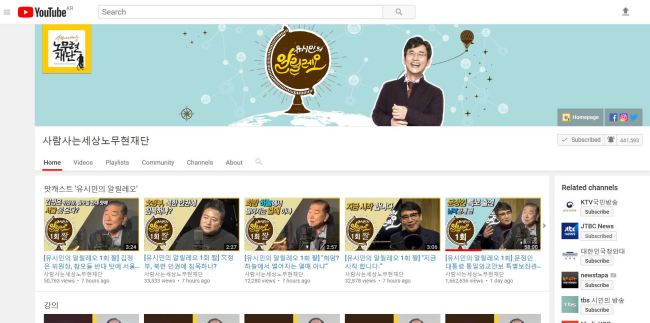With the platform rising as a battleground for conservative and liberal politicians here, Rhyu Si-min, a liberal politician-turned-writer, posted his first video Friday, aiming to rival that of conservative firebrand Hong Joon-pyo.
In the first episode of the hourlong weekly series “Rhyu Si-min’s Alileo,” Rhyu was joined by Moon Chung-in, a special adviser to the president on unification, foreign affairs and security. The video has garnered 1.4 million hits on YouTube as of Sunday afternoon.

The number of subscribers to the Roh Moo-hyun Foundation’s YouTube channel, where Alileo is posted, soared to nearly 420,000 subscribers from some 90,000.
“I plan to play the role of a navigator, and introduce the roots and background of national policies along with key information,” Rhyu said in the first YouTube post.
“Many government policies are not on track and at times pulled out because of a lack of attention, which is why I decided to start Alileo,” he added.
The Roh Moo-hyun Foundation is expected to upload another podcast series led by Rhyu this week, aimed at taking on fake news.
The first 20-minute episode, to be posted Tuesday morning, is expected to contain Rhyu’s position on rumors of his return to politics.
On social media, Hong downplayed his rival’s successful YouTube debut, calling Rhyu a “North Korea’s Korean Central Television-like leftist YouTuber who will run out of content within a month.”
Before Rhyu’s YouTube debut, Hong was the most influential politician in terms of the number of subscribers and popularity.
Since the launch of his YouTube channel last month, Hong has freely expressed his thoughts about the Moon administration through various series: three- to five- minute “News coke!” briefings on administrative policies and social issues; a 30-minute talk show featuring experts on North Korea and Korea’s economy; and on-air live shows.
Hong’s channel TV Hongka Cola has so far gained 210,000 subscribers, and its most-watched clip has 470,000 views.
The firebrand politician, however, has come under fire for making unconfirmed allegations, such as claims that the former Kim Dae-jung and Roh Moo-hyun administrations secretly sent $500 million in cash to North Korea in exchange for inter-Korean summits.
These alleged payments are in addition to a similar sum already investigated in 2003.

Hong’s remarks sparked concerns that politicians would focus on posting provocative content to stand out and win viewership, but experts predict the transition to YouTube will continue.
To tighten its grip in the new battleground, ruling Democratic Party will include activities on social media in the four assessment criteria used to evaluate incumbent lawmakers standing for next general election in April 2020.
“The platform is beneficial for both viewers and politicians. Viewers can selectively watch content made by the politicians they prefer. Meanwhile, politicians can create clips containing information they wish to convey and bolster loyalty, which is key in politics,” said Han Dong-sub, a professor of Media and Communication at Seoul-based Hanyang University.
In traditional media, such as television and radio, producers had the right to edit the show, whereas on YouTube, politicians can edit their own posts.
The accessibility and popularity of YouTube makes it an optimum platform for politicians and supporters, Han said, adding that viewers need to be aware of fake news.
According to mobile app usage researcher WiseApp, 31.22 million South Koreans spent a total 31.7 billion minutes on YouTube in November last year, followed by 19.7 billion minutes on mobile messenger Kakao Talk, 12.6 billion minutes on web portal Naver.
Noting the mass viewership on YouTube, Hong described the platform as having “more social influence than a cable channel” and said would soon set up a corporate entity to operate TV Hongka Cola.
By Kim Bo-gyung (lisakim425@heraldcorp.com)










![[Today’s K-pop] BTS pop-up event to come to Seoul](http://res.heraldm.com/phpwas/restmb_idxmake.php?idx=644&simg=/content/image/2024/04/17/20240417050734_0.jpg&u=)
![[Graphic News] More Koreans say they plan long-distance trips this year](http://res.heraldm.com/phpwas/restmb_idxmake.php?idx=644&simg=/content/image/2024/04/17/20240417050828_0.gif&u=)
![[KH Explains] Hyundai's full hybrid edge to pay off amid slow transition to pure EVs](http://res.heraldm.com/phpwas/restmb_idxmake.php?idx=644&simg=/content/image/2024/04/18/20240418050645_0.jpg&u=20240419100350)




![[KH Explains] Hyundai's full hybrid edge to pay off amid slow transition to pure EVs](http://res.heraldm.com/phpwas/restmb_idxmake.php?idx=652&simg=/content/image/2024/04/18/20240418050645_0.jpg&u=20240419100350)

